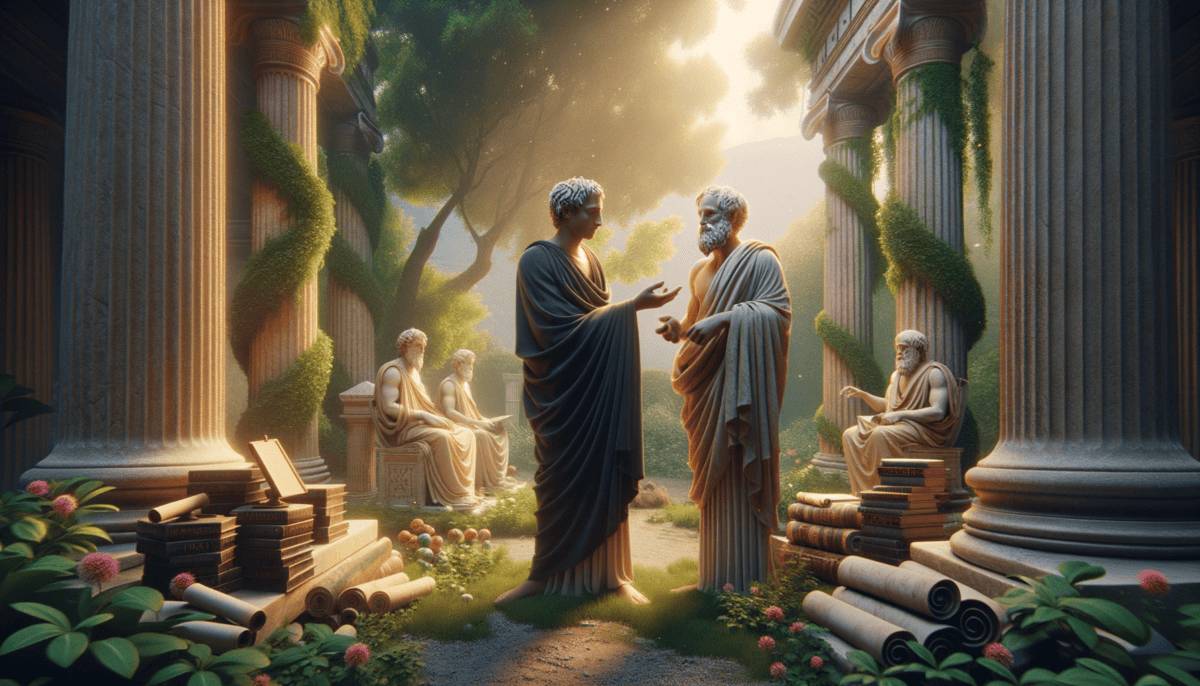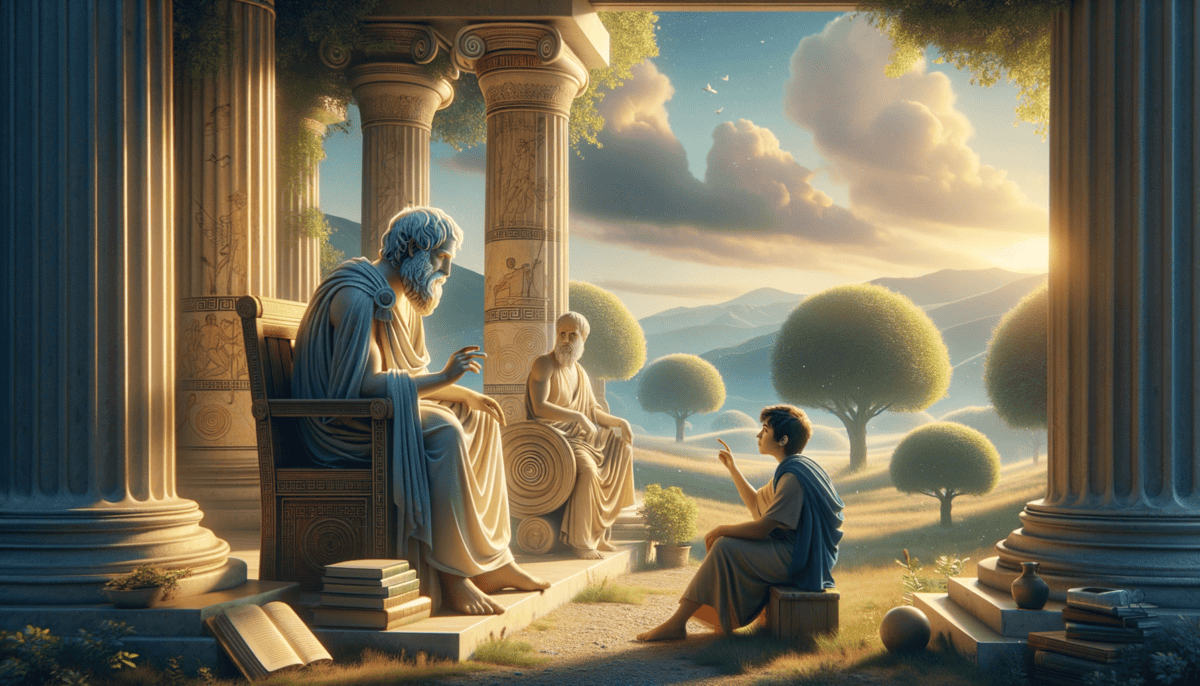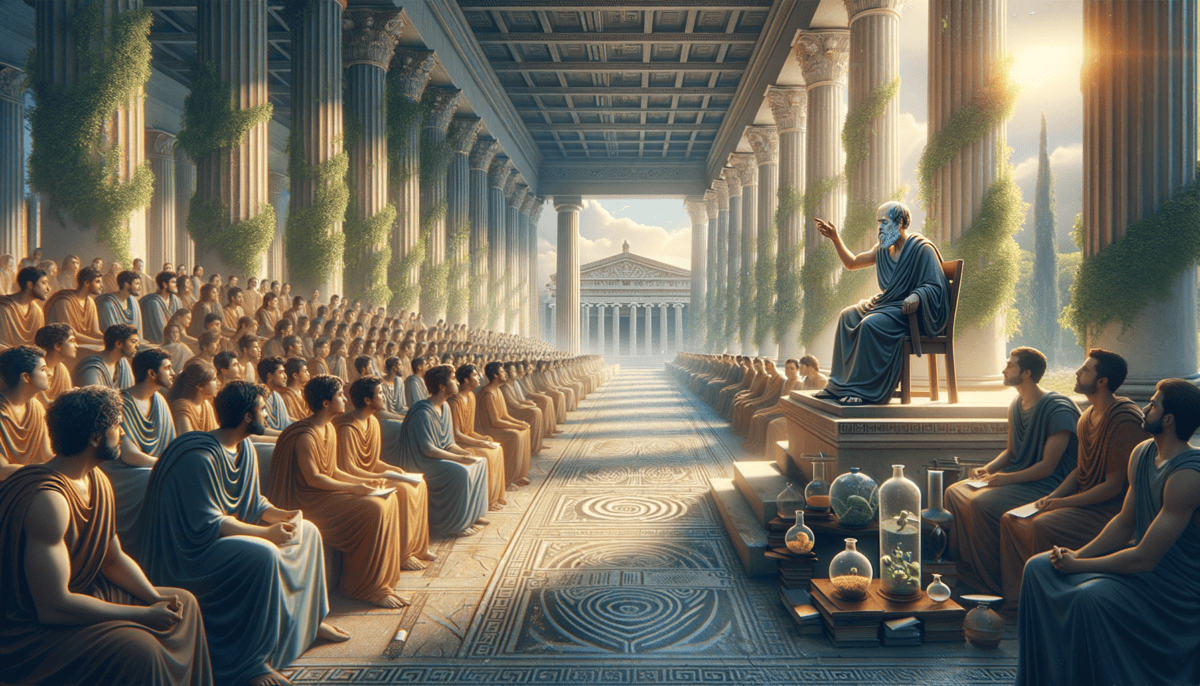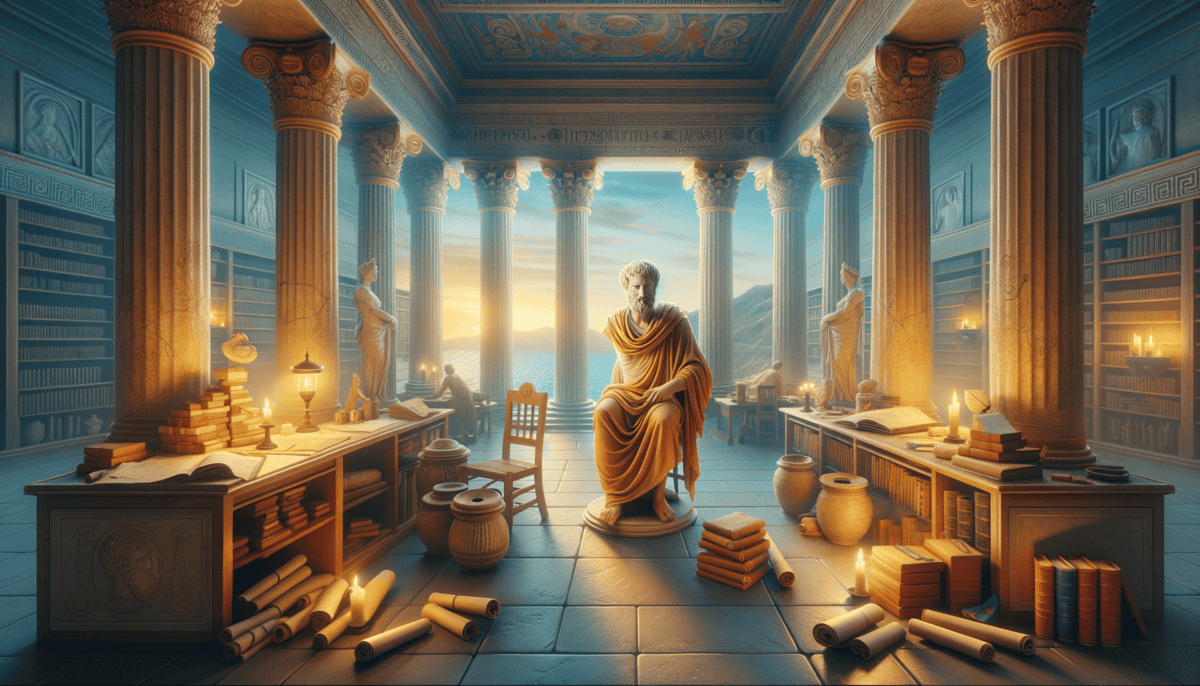A Curious Boy in Ancient Greece
Long, long ago, in a place called Stagira, a special baby was born. His name was Aristotle. The year was 384 BCE, and his family was very happy. His father was a doctor who helped the king stay healthy!
“This child has special eyes,” his mother would say. “He looks at everything as if trying to understand all the secrets of the world.”
Little Aristotle loved to ask questions about everything he saw. He would point at birds and ask, “Why do they fly?” When he saw fish in the sea, he would wonder, “How do they breathe under water?”
His father would smile and say, “My son, to find answers, you must watch carefully and think deeply.”
“But why, father?” Aristotle would ask.
“Because that’s how we learn about our world,” his father would answer, patting his head.
Aristotle’s parents taught him to love learning. His father showed him how to look at plants and animals. His mother told him stories about heroes and gods. They were happy together.
But when Aristotle was just ten years old, something sad happened. His parents got very sick and died. His uncle Proxenus became his new guardian.
“Don’t worry,” his uncle said kindly. “We will take care of you, and you will go to the best school in Athens!”
Athens was a big city where many smart people lived and taught. Young Aristotle packed his things and went on a long journey. He was scared but excited too. ️
When he got to Athens, he saw something amazing. It was a big school called Plato’s Academy. The building was white and beautiful, with tall columns reaching up to the sky.
At the Academy, Aristotle met other students who loved to learn just like him. They would sit together and talk about stars, animals, plants, and why things happen the way they do.
“Welcome, young one,” said an old man with kind eyes. It was Plato himself, the wisest teacher in Athens. “I can see you have many questions in your mind.”
Aristotle smiled and nodded. He knew this was just the beginning of his amazing journey. Even though he missed his parents, he was ready to learn everything he could.
Every day, Aristotle would wake up early, excited to learn new things. He wrote everything down in scrolls, using a special pen and ink. His teachers said he was one of the best students they had ever seen. ✍️
Other students would often ask him for help. “Aristotle, can you explain this to me?” they would say. He was always happy to help others understand difficult things.
At night, he would look up at the stars and think about all the new things he had learned. He knew that one day, he would become a great teacher too.
Growing Wisdom at the Academy
The sun rose over Athens each morning, and young Aristotle was always first to arrive at Plato’s Academy. His sandals would make soft sounds on the marble steps as he rushed to learn more.
“Good morning, eager one,” Plato would say with a smile. Aristotle beamed at his teacher, ready for another day of discovery.
In the Academy’s garden, Aristotle loved watching tiny bugs crawl on leaves. He would write down everything he saw in his scrolls.
“Look closer,” Plato taught him. “Nature has many secrets to share.”
One day, while studying a butterfly, Aristotle had a big idea. “Teacher,” he said to Plato, “I think we can learn more by watching things carefully than just thinking about them.”
Plato raised his eyebrows. This was different from what he taught. But he liked that Aristotle thought for himself.
As Aristotle grew older, he started teaching younger students. They loved his lessons because he made hard things easy to understand.
“Why does rain fall from the sky?” a young student asked.
Instead of just giving the answer, Aristotle showed them. He boiled water and watched the steam rise and turn back into drops. “See?” he said. “That’s what happens in the clouds too!”
Sometimes, Aristotle and Plato would have friendly arguments about big ideas. Other students would gather around to listen. ️
“Maybe there’s more than one way to find the truth,” Aristotle would say.
Plato would nod thoughtfully. “You’re becoming quite wise, my student.”
Aristotle started writing his own books. He wrote about animals, plants, stars, and how people should live good lives. His words were like little seeds that would grow into big ideas later. ✍️
Some of his favorite things to study were:
- How animals move and grow
- Why stars shine at night
- What makes people happy
- How to be a good friend
- Why things change over time
One day, a messenger came to the Academy. He carried important news that would change Aristotle’s life forever.
“King Philip of Macedonia wants you to teach his son, Prince Alexander,” the messenger announced.
Aristotle looked at Plato, who smiled proudly. “You’re ready,” Plato said. “You’ve learned all I can teach you. Now it’s time for you to teach others.”
As Aristotle packed his scrolls and said goodbye to his friends at the Academy, he felt both sad and excited. He had grown from a curious boy into a wise teacher. Now, new adventures waited for him.
The other teachers and students gathered to say goodbye. “Remember,” Plato said, giving him a hug, “keep asking questions and looking closely at the world. That’s how we grow wise.”
Teaching a Future King
Aristotle arrived at the grand palace in Macedonia. The guards led him through tall golden doors to meet Prince Alexander. The young prince was only thirteen, but his eyes sparkled with curiosity.
“Welcome, Teacher,” Alexander said, standing tall. “I want to learn everything about the world!”
Aristotle smiled. “Then let’s begin with something amazing.” He pulled out a map. “The world is bigger than you can imagine.” ️
Every morning, they would meet in a special garden classroom. Alexander loved hearing stories about far-away places and different people.
“To be a good king,” Aristotle taught, “you must first understand the people you lead.”
One day, they studied animals together. Alexander was fascinated by lions and eagles.
“Why do you think lions live in groups?” Aristotle asked.
“Because they’re stronger together!” Alexander answered excitedly. “Just like people!”
Aristotle nodded proudly. His student was learning fast.
They studied many important things together:
- How to make good choices
- Ways to solve problems
- Understanding different cultures
- The importance of being fair
- How to be a wise leader
Sometimes, they would climb a hill to watch the stars. ⭐
“Each star has a story,” Aristotle would say. “Just like each person in your kingdom will have a story.”
Alexander loved learning about plants too. They created a special garden where they grew healing herbs.
“See how this tiny seed becomes a strong plant?” Aristotle showed him. “That’s how knowledge grows in our minds.”
King Philip often watched their lessons from his window. He was happy to see his son growing wiser each day.
One morning, Alexander rushed into their classroom with exciting news.
“Father says I can join him in battle soon!” His eyes shined with excitement.
Aristotle felt proud but worried. “Remember what we learned about being wise and fair,” he said gently.
“I will, Teacher. I’ll make you proud!” Alexander promised.
Year after year, Alexander grew taller and stronger. But more importantly, he grew wiser. He learned to think carefully before making big choices.
“The greatest victory,” Aristotle taught him, “is winning without fighting.”
When Alexander turned sixteen, he was ready to help lead his kingdom. At their last lesson, he hugged his teacher tightly.
“Thank you for teaching me to think, not just to fight,” Alexander said.
Aristotle watched his student become a leader. He knew it was time for his next adventure – starting his own school in Athens. But that’s another exciting story!
A New Dream Takes Shape
After teaching Alexander, Aristotle walked the busy streets of Athens. He had a big dream – to build a special school where everyone could learn. ️
“This is the perfect spot!” Aristotle said, looking at a sunny clearing with tall olive trees. “We’ll build our school right here.”
Everyone helped build the school. Students carried stones, and teachers brought scrolls filled with wisdom.
“Learning is like climbing a tree,” Aristotle told them. “Each branch leads to new discoveries!”
The school was different from others. Students didn’t just sit and listen – they went outside to learn!
“Look at this butterfly,” Aristotle would say, as they walked in the gardens. “See how its wings work?”
The children watched in wonder as he showed them new things:
- How plants grow from tiny seeds
- Why birds build different kinds of nests
- What makes the weather change
- How animals take care of their babies
- Why stars move across the night sky
“Teacher,” a young student asked, “why do leaves turn yellow in fall?”
“Let’s find out together!” Aristotle smiled. He loved when students asked questions.
They made a special library where they kept all their discoveries. Students wrote about everything they learned.
“Writing helps us remember,” Aristotle explained. “And sharing helps others learn too!”
The school became famous. People came from far away to learn. Some walked for many days just to get there!
“What makes rain fall?” one student would ask.
“How do fish breathe underwater?” another wondered.
Aristotle taught them to look closely at everything. “The world is full of wonderful secrets,” he said. “We just have to pay attention!”
Every morning, students gathered in the walkways. These covered paths were perfect for thinking and talking while walking. ♂️
“My legs move while my mind moves!” laughed one student.
They studied everything: stars, plants, animals, numbers, and words. But most importantly, they learned how to think carefully about big questions.
“Why are we here?”
“What makes someone good?”
“How can we be happy?”
The school grew bigger. More students came every year. They built new rooms for studying different things. ️
Some students looked at tiny things with special tools. Others watched the stars at night. Many wrote poems and stories.
“Learning is like lighting a lamp,” Aristotle would say. “Once it’s lit, it can light other lamps too!”
His students took their knowledge to many places. They became teachers, doctors, and leaders. Each one carried a little piece of the Lyceum with them.
But not everyone in Athens was happy about Aristotle’s new ideas. Some people didn’t like change. Dark clouds were gathering over the Lyceum, but Aristotle kept teaching and learning. ️
Dark Clouds Over Athens
The sun wasn’t shining as bright over the Lyceum anymore. Some people in Athens didn’t like Aristotle’s new ways of thinking. ️
“Why does he let his students ask so many questions?” whispered some angry voices in the city.
Aristotle kept teaching, even when things got hard. “Questions help us learn,” he told his worried students.
“Being brave doesn’t mean you’re not scared. It means doing what’s right even when you are scared.”
One morning, a friend rushed to the Lyceum. “Aristotle, some people are saying bad things about you!”
“What kind of things?” Aristotle asked calmly.
“They say you don’t believe in the city’s old ways. They’re very angry!”
Aristotle looked at his beloved school. Students were walking in the gardens, learning and growing.
His students worried about him. “Teacher, what will happen to our school?” ️
“Knowledge is like water,” Aristotle said with a smile. “It finds a way to flow, no matter what.”
But things got worse. Some powerful people in Athens wanted to hurt Aristotle. They didn’t like that he was friends with Alexander the Great.
“We must protect our books and writings,” Aristotle told his helpers. They carefully packed their precious scrolls.
One student asked, “Are you scared, teacher?”
“Yes,” Aristotle answered honestly. “But being scared doesn’t stop us from being wise.”
The weather matched the mood in Athens. Storm clouds gathered overhead. ️
“I won’t let them hurt our school,” Aristotle decided. He knew he had to leave Athens to keep his students safe.
Before leaving, Aristotle gathered his students one last time. “Remember what you learned here,” he said. “Keep asking questions. Keep looking for answers.”
The students hugged their teacher goodbye. Some were crying.
“Will you come back?” they asked.
“The truth always finds its way back,” Aristotle said softly. “Just like the sun after a storm.” ☀️
He packed his things and left the city he loved. But his ideas couldn’t be packed away. They had already spread like seeds in the wind.
Even as Aristotle walked away from Athens, his students kept learning. They shared what they knew with others. The flame of knowledge kept burning bright.
Far away, in a quiet place by the sea, Aristotle started writing down all his ideas. He wanted to make sure his teachings would live forever. ✍️
“Ideas are stronger than angry words,” he wrote. “Truth is more powerful than fear.”
The dark clouds over Athens couldn’t stop what Aristotle had started. His teachings were like stars – they would keep shining for thousands of years. ⭐
A Legacy That Shines Forever
Far from Athens, in a peaceful place called Chalcis, Aristotle found a new home by the sea. The waves reminded him of how knowledge flows and never stops.
Every morning, he walked along the beach, watching tiny creatures in tide pools. “Look how amazing nature is!” he would say to himself.
Letters came from his old students in Athens:
“Dear Teacher, we miss you! We’re still asking questions, just like you taught us.”
This made Aristotle smile. His ideas were growing, like flowers in a garden.
“What makes you happy, grandfather?” asked his little grandson one day.
“Knowing that people are still learning,” Aristotle answered, giving him a big hug.
Even though he was getting older, Aristotle worked hard to write down everything he knew about:
- Animals and plants
- Stars and weather ⭐
- How to be good friends
- Ways to think clearly
- Rules for being happy
“Your words will help people forever,” said a friend who visited him.
“That’s all I ever wanted,” Aristotle replied softly. “To help people think and learn.”
One evening, watching the sunset, Aristotle thought about his long life:
“I was once a curious little boy in Stagira. Then a student in Athens. A teacher to a great king. And now, my ideas travel further than I ever could.”
He thought about his old school, the Lyceum, and smiled. His students there were now teachers themselves.
The next morning, more letters arrived:
“Teacher, we opened a new school!”
“Your books helped me understand the stars!”
“I taught my children what you taught me!”
Aristotle knew his time was growing short. But he wasn’t sad. His ideas had become like lights in the darkness, helping people find their way. ✨
“Remember,” he told his family, “the more you learn, the more you grow. Never stop asking questions.”
Today, thousands of years later, Aristotle’s words still teach us. In schools, libraries, and homes around the world, people read his ideas.
His questions still make us think. His wisdom still helps us grow. His love for learning still lights the way.
And somewhere, maybe a child is looking at the stars, or watching a butterfly, or asking “why?” – just like young Aristotle did so long ago. The story of learning never ends. ⭐






